First road wireless charging system successfully tested

A specially designed truck was successfully charged on a public road for the first time worldwide.
The attempt is part of the Smartroad Gotland Project that aims to create a 1.6-kilometer electric road utilized by bus services in the route between the airport and center of Visby town, located on the island of Gotland, Sweden.
The project that is funded by Trafikverket, the Swedish Transport Administration and led by ElectReon AB, is part of the county's endeavor to reduce its environmental footprint.
In November 2019, the developers installed the first ERS (Electric Road System) on the road. ERS is capable of wireless transferring electric power to vehicles while they are still moving. In particular, a series of electrical coils are placed below the asphalt surface of the road and transfers power to special receivers that can be installed in all kinds of vehicles (e.g. cars and buses). Therefore, there is no need for electric vehicles to stop for charging or utilizing batteries with big capacity. The coils are installed at a depth of 8-10 centimeters below the road surface. In general, a car and a 40-ton truck will need to install 1 and 5 receivers, respectively.
A management system is monitoring the amount of energy stored at each vehicle and bills its owner. The ERS will function only when it detects an electrical vehicle.
The test was conducted in early 2020 when harsh weather conditions devastated the road. Even so, the attempt was successful. A truck weighing 40 tons was charged on a 50-meter road section both in static and in dynamic conditions (driving at a maximum velocity of 29km/h). 5 receivers, each of 20kW, were installed in the truck and they managed to recharge it with 90% efficiency in static conditions.
The initiative is an attempt to bring the project closer to commercialization. "The purpose of the new test facility was to integrate and test the full ElectReon system with management unit, coils, and receivers before operations start on the public road of Gotland...The system was activated and supervised remotely enabling management of all relevant charging and metering parameters," Smartroad Gotland consortium, stated.
When the 1.6-kilometer roadway is completed, the truck will be able to travel the distance between Visby and the airport using wireless electric power while any surplus energy can be stored in its batteries.
Providing wireless electric power is a convenient technique that addresses all the limitations imposed by electric cables. However, until today, there has not been adequate systems for wireless charging with reliable effectiveness.
Sources: Greencarreports, Insideevs, Greencarcongress
Sources: Greencarreports, Insideevs, Greencarcongress
Media
- Smartroad Gotland: wireless charging of a 40 ton electric truck
- Videos zur Elektromobilität
Want to read more like this story?
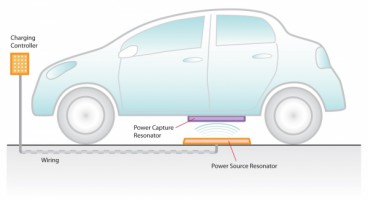
World's first electric road to be constructed in Sweden
Apr, 16, 2019 | NewsThe world's first electric roadway that will utilize wireless vehicle charging technology will be co...

Smart technology in road infrastructure
Nov, 25, 2019 | NewsA new project, currently conducted in the United Kingdom, aims to produce energy from traffic, compl...
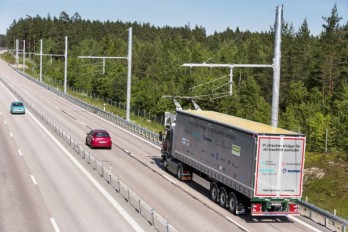
World’s first electric highway for trucks has opened in Sweden
Jul, 10, 2016 | NewsIt can power trucks on the go using overhead wires It can power trucks on the go using overhead w...
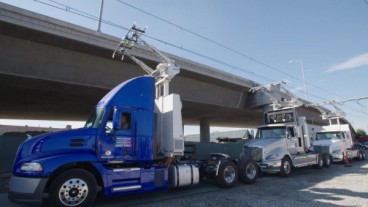
First US electric highway for trucks opens in California
Nov, 24, 2017 | NewsThe technology has the potential to reduce emissions and improve air quality The technology has the...

Challenges for sustainable road networks in UK
Jan, 10, 2021 | NewsPreserving road networks is a challenging and abiding task that requires both short-term and lo...

Paving the way to the future
Feb, 17, 2016 | NewsFrance is the first country to install solar panels onto 1000km of public roads The French govern...
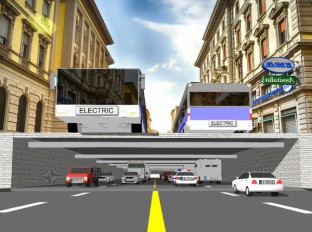
Deep roads to alleviate traffic and reduce pollution
Feb, 22, 2019 | NewsA new study presents an alternative road construction idea to reduce pollution and congestion in urb...

New pavement characteristics to improve truck's fuel consumption
Jun, 11, 2020 | NewsAccording to a new study, certain modifications of road surfaces can lead to a significant reduction...

From Setback to Progress: The Future of UK Road Safety
Sep, 19, 2024 | NewsThe United Kingdom, once a global leader in road safety, has seen its progress stagnate over the pa...
Trending
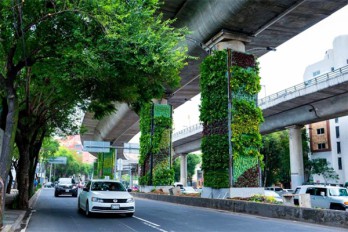
Vertical gardens in Mexico City to combat pollution

Saudi Park Closed After 360 Big Pendulum Ride Crashes to Ground, 23 injured

Characteristics of Load Bearing Masonry Construction

Taipei 101’s impressive tuned mass damper

Dutch greenhouses have revolutionized modern farming

Federal court rules Biden’s offshore drilling ban unlawful


